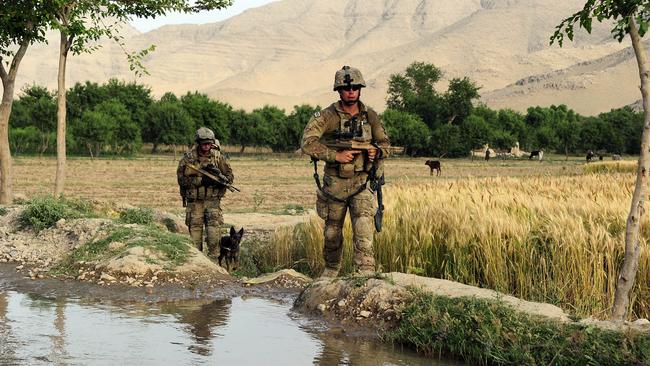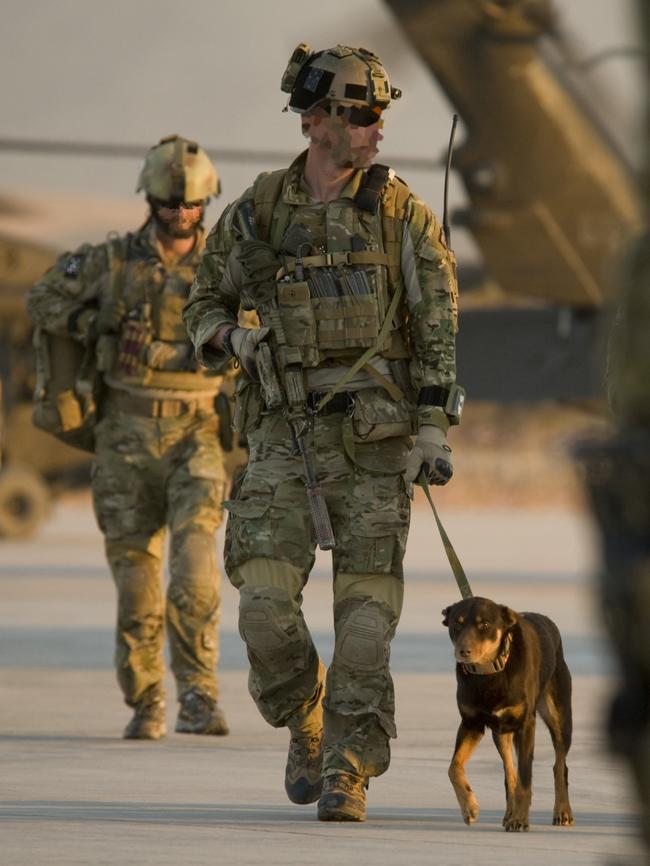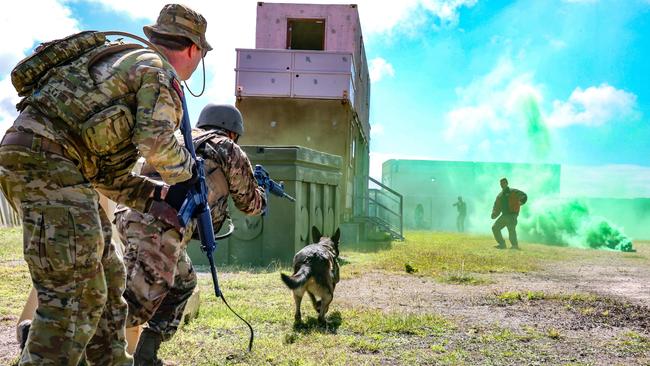ADF orders war dog handlers to undergo cultural awareness training
Special Forces’ war dog handlers have been ordered to face retraining to be more culturally sensitive when confronting the enemy.
National
Don't miss out on the headlines from National. Followed categories will be added to My News.
Military dog handlers will be retrained to limit “cultural sensitivity risks” when confronting enemy fighters or terrorists, in a woke extension of the ADF’s Special Forces overhaul.
The bizarre edict from Chief of the Defence Force Angus Campbell is among 48 newly completed culture directives stemming from the damming Afghanistan Inquiry.
The updated directives list also includes strategies to address “exceptionalism” and “ethical drift” among elite soldiers and tighter accountability laws.
The ADF Military Working Dogs (MWD) edict mandates they must only be used now in “reasonable circumstances” and not as a tool to elicit information from a captured person or under control during tactical questioning.

“Handlers are expected to ensure their use of ADF Military Working Dogs is reasonable and necessary in the circumstances,” Defence policy notes.
“Those directing or employing ADF MWD teams are expected to be cognisant of any cultural sensitivities in relation to the use of ADF MWD and, where circumstances allow, take active steps to minimise cultural sensitivity risks associated with such use.”
Exercise scenarios are now assessing the new “appropriate use” of the dogs’ capability.
Special Forces used dogs extensively in the Middle East and regionally to sniff out weapons and explosives or on patrol about our military bases but in some Islamic cultures the animals are deemed impure and offensive.

SAS Association chairman Martin Hamilton-Smith branded the dog directive another woke initiative.
“Of all the problems facing Defence, they’ve spent a lot of time on the Afghan allegations and in the meantime recruitment and retention is dire, there is problems with procurement and sustainment of capital equipment, there is evidence of serious mismanagement in Defence and a disproportionate time spent dealing with things that happened 15 years ago and second order issues like dog culture,” he said.
“I think the Australian people would welcome leadership and the ADF getting back to capability rather than second-order issues.”
Three years since the war crimes inquiry sparked reforms and a criminal investigation, Defence has revealed 200 former soldiers have now been specifically affected and were seeking mental health and welfare help.
That’s eight times the 25 soldiers implicated in the 2020 Brereton review being directly investigated by the Office of Special Investigator (OSI) with the Australian Federal Police.
The 200, according to internal Department of Veterans’ Affairs files have identified being specifically “affected” by the inquiry fallout in appealing for wellbeing.

The new figure comes after confirmation Gen. Campbell and the chiefs of Army, Navy and the RAAF will appear before the Royal Commission into Defence and Veteran Suicide with public hearings to begin again in Sydney from next week.
Mr Hamilton-Smith said the continuing OSI probe was taking a toll on many and so far only one soldier had been charged.
“I think a line needs to be drawn in the sand and the OSI directed to either put up or be wound up, either charge people or wind up proceedings otherwise will this go on for what, another five years, 10 years?”
He said SASA supported due process but hearsay always came with war and the OSI needed to present facts to a criminal court or risk a permanent cloud over the ADF.




